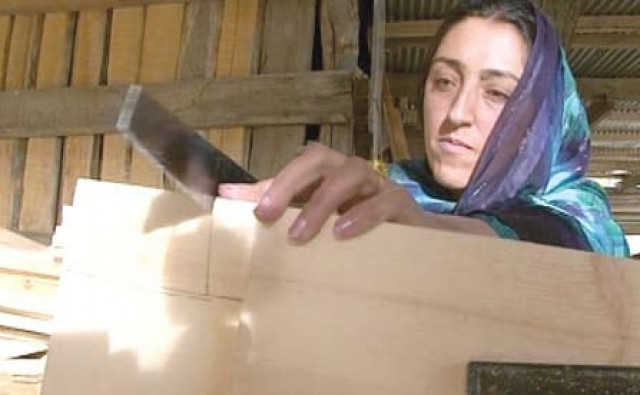‘Safar hai shart’: Lessons from Hunza for Pakistan
Women in paradise on earth stand as tall as men.

‘Safar hai shart’: Lessons from Hunza for Pakistan
A recent episode of Express TV’s “Safar hai shart” featured women in Hunza working as carpenters and plumbers — to see such well-qualified women working shoulder-to-shoulder with men was awe-inspiring.
The women of Hunza have not only proven their worth in mainstream careers like medical, law, politics and forces but also in careers that are usually associated only with men -- plumbing, carpentry, masonry and iron works.
A fort in Hunza is being restored and the interesting aspect of this restoration project is more than sixty percent of skilled workers are females contributing services in woodwork, masonry, electrification and plumbing. Samina Khayal, a proud woman of Hunza, is the first Pakistani female mountaineer who scaled the previously unclimbed Chashkin Sar (6400 metres high) in Hunza.
We are habituated to read, listen and watch horrible stories about women: a mother forced to parade naked in a village, three women buried alive for choosing husbands, a 17-year-old girl was publicly whipped by the Taliban in Pakistan’s restive Swat, a four-year-old girl raped and strangled in Karachi.
“Pakistan is the worst place for women in the world.”
In such a state of affairs the news about women of Hunza was a fresh air and I suddenly started to believe that I am living in the world and not hell. Salute to the women of Hunza for shattering taboos and defying the patriarchal social system.
The men and women of Hunza together ornamented dazzling beauty of the valley defying inhospitable surroundings and laboured hand-in-hand in every walk of life to make Hunza the most beautiful place on the earth.
As much as Hunza is famous for its ethereal grandeur, its habitants are also well-known for their simplicity, friendliness, straightforwardness and hospitality. A visitor said, “It is a beautiful place not just because of the snow-capped peaks and the apricot blossoms, but because the nature of its dwellers too.”
Gulf News reports, “Hunza [is] an oasis of peace and order in crime-infested [Pakistan].”
Literacy rate of Hunza is more than 90 per cent -- far higher than the rest of Pakistan mainly because the people of Hunza have put their resources on educating their children instead of exhausting their earnings on better living. This special hallmark of Hunza is well-portrayed in the travelogue by the two bikers in “Safar hai shart” in the episode about Gulimit and Phaso, Hunza.
What lessons we can learn from the Hunza experience?
The first lesson is empowering women. United Nations Deputy Secretary-General Asha-Rose Migiro told the International Women Leaders Global Security Summit in New York that study after study has shown us that when women are fully empowered and engaged all of society benefits and only in this way can we successfully take on the enormous challenges confronting our world. Napoleon said, “Give me good mothers and I will give you a good nation.”
The second lesson is giving priority to education. Education plays a pivotal role for society by refining future generations who will be able to express their individuality and creativity, thus improving society as a whole.
The third lesson is living a simple and straightforward life. Simplicity is the key to free our souls from crimes, chaos, depressions, hypertensions and anxieties of the modern society. We are hankering after the worldly gains no matter what it takes and in this blind pursuit we have lost the precious contentment for the ultimate luxuries. As the saying goes, “Simplify your life, the laws of the universe will be simpler; solitude will not be solitude, poverty will not be poverty, nor weakness a weakness.”
The author is a Content Writer.
Published in The Express Tribune, July 27th, 2011.



















COMMENTS
Comments are moderated and generally will be posted if they are on-topic and not abusive.
For more information, please see our Comments FAQ